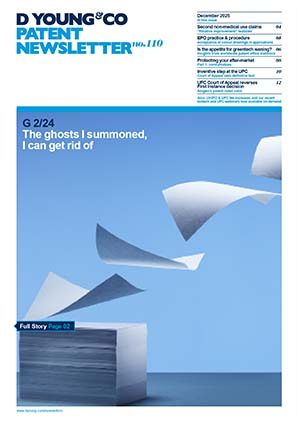One for all and all for one? Validity of an opt-out of the UPC
The Court of Appeal of the Unified Patent Court (UPC) has issued a decision on the validity of an opt-out. This decision was issued in the case of Neo Wireless GmbH & Co KG v Toyota Motor Europe NV/SA.
With this decision, the UPC Court of Appeal has held that a valid opt-out application requires that it is lodged by or on behalf of all proprietors of all national parts of a European patent.
What is an opt-out?
An opt-out is a mechanism by which a patent owner can remove European patent applications and European patents from the jurisdiction of the Unified Patent Court. The default position is that all European patent applications and European patents are subject to the UPC, unless an opt-out is filed.
If an opt-out is filed, any litigation would take place via the national courts.
Notably, the opt-out is related only to European patents and European patent applications. An opt-out cannot be filed for unitary patents which are always subject to the jurisdiction of the UPC.
Case background
Neo Wireless LLC, Wayne, USA (Neo USA) was the original owner of a European patent EP 3876490. During prosecution of the application, an assignment was made to transfer ownership of the German part of the patent application to Neo Wireless GmbH & Co KG, Ratingen, Germany (Neo).
Before grant, Neo USA filed an opt-out from the jurisdiction of the UPC. However, this opt-out application was not filed on behalf of Neo (the owner of the German part of the application).
The European patent granted on 17 May 2023.
After this time, Toyota Motor Europe NV/SA (Toyota) brought a revocation action before the Central Division Paris of the UPC against the patent. In response, Neo filed a preliminary objection questioning the competence of the court in this case; Neo argued that the patent did not fall under the jurisdiction of the UPC since an opt-out had been filed.
However, the judge at the Court of First Instance held that the opt-out which had been filed was invalid (for the reasons discussed in detail later). The appeal on which the UPC Court of Appeal has issued this decision was an appeal against the decision of the judge at the Court of First Instance.
The appeal
Article 83(3) of the Agreement on a Unified Patent Court (UPCA) requires that: “Unless an action has already been brought before the Court, a proprietor of or an applicant for a European patent granted or applied for prior to the end of the transitional period… shall have the possibility to opt out from the exclusive competence of the Court”
Furthermore, Rule 5.1(a) of the Rules of Procedure (RoP) requires that: “Where the patent or application is owned by two or more proprietors or applicants, all proprietors or applicants shall lodge the Application to opt out”
The judge at the Court of First Instance held the opt-out filed by Neo USA to be invalid because not all proprietors of all national parts of the European patent had lodged the application to opt-out as required by Rule 5.1(a) RoP.
On first reading, it may therefore appear that the question as to who can validly file an opt-out is settled. Rule 5.1(a) RoP addresses the specific situation where the patent or application is owned by two or more proprietors or applicants. In this situation, Rule 5.1(a) clearly requires that all proprietors or applicants shall lodge the opt-out application.
However, it must be remembered that in the case of conflict between the UPCA and the RoP, the provisions of the UPCA prevail. This is explained in Rule 1 RoP.
In the appeal, Neo argued that Rule 5.1(a) RoP must be ignored since it conflicts with Article 83(3) UPCA. According to the arguments put forward by Neo, Article 83(3) UPCA provides that a (in the singular) proprietor or an (in the singular) applicant can opt an application out of the jurisdiction of the UPC. Indeed, Neo stated that if the proprietor of only some national parts of a European patent would require the agreement of holders of the other national parts to opt-out, this proprietor would be unduly and disproportionally impaired in exercising his ownership rights, as no patent holder should be forced into the UPC.
Accordingly, at the heart of the appeal is the question as to whether Article 83(3) UPCA allows the proprietor of one or more, but not all, national parts of a patent (application) to validly lodge an application to opt out.
Decision
In the decision, the UPC Court of Appeal provided a detailed analysis of the arguments put forward in the appeal. Ultimately, the UPC Court of Appeal determined that the appeal was not justified. Therefore, the patent had not been validly opted out by Neo USA and remained under the jurisdiction of the UPC.
The reasoning provided by the UPC Court of Appeal does not rely specifically on the provisions of Rule 5.1(a) RoP. Rather, the UPC Court of Appeal based its reasoning on an interpretation of the wording of Article 83(3) UPCA itself.
The general rule of interpretation for international treaties is set out in Article 31(1) Vienna Convention on the Law of Treaties (1969) which states that: “A treaty shall be interpreted in good faith in accordance with the ordinary meaning to be given to the terms of the treaty in their context and in the light of its object and purpose”
The UPC Court of Appeal acknowledged that the requirement that the opt-out is lodged by or on behalf of all proprietors of all national parts of a European Patent does not arise based on the “ordinary meaning” of the wording of Article 83(3) UPCA. In this regard, the UPC Court of Appeal noted that the wording “a proprietor of or an applicant for” could indicate the singular (so that only one proprietor or applicant is required to validly declare an opt-out). Alternatively, the UPC Court of Appeal noted that the wording “a proprietor of or an applicant for” could indicate the capacity of the opt-out applicant (that is, only that a proprietor or an applicant can validly declare an opt-out).
Likewise, the UPC Court of Appeal found that this requirement does not arise from the meaning of Article 83(3) UPCA when read in ”context” either.
However, when taking account of the “object and purpose”, the UPC Court of Appeal held that Article 83(3) UPCA must be interpreted such that a valid opt-out application requires that it is lodged by or on behalf of all proprietors of all national parts of a European patent.
This UPC Court of Appeal arrived at this position in view of the fundamental default position chosen by the legislator that a European patent (application) will fall under the jurisdiction of the UPC unless a valid opt-out is filed. The UPC Court of Appeal held that an interpretation of Article 83(3) UPCA whereby all proprietors of all national parts must file the opt-out is in accordance with this default position. If not all proprietors of all national parts of the European patent file the opt-out, the “default position” stays in place.
The UPC Court of Appeal stated that the consequences of this choice made by the legislator cannot be considered as unfair or unduly impairing a proprietor from exercising its ownership rights. The UPC Court of Appeal noted that the consequences of the interpretation put forward by Neo whereby only one proprietor may opt-out with effect for all national parts (even those parts that they do not own) are not less burdensome.
The appeal was thus held to be unjustified.
Conclusion
The phrase “One for all and all for one” is not valid with respect to an opt-out from the UPC. Rather, the opt-out must be lodged by or on behalf of all proprietors of all national parts of a European patent.
The decision which has been issued by the UPC Court of Appeal is not surprising in this respect. Nevertheless, the decision provides a timely reminder for those seeking to remain outside the jurisdiction of the UPC of the importance of accurately ascertaining the proprietor of a European patent (application) when lodging an opt-out.
An issue with the opt-out application may only become apparent if that opt-out is challenged during proceedings before the UPC. At this time, it will be too late to repair the opt-out if the opt-out is found invalid.
Accordingly, particular care must be taken when lodging an opt-out if an assignment has taken place for a part of the European patent (application).
Case details at a glance
Decision level: Court of Appeal, Luxembourg
Case: UPC_CoA_79/2024
Order/decision: ORD_30505/2024
Parties: Neo Wireless GmbH Co KG v Toyota Motor Europe
Date: 04 June 2024

